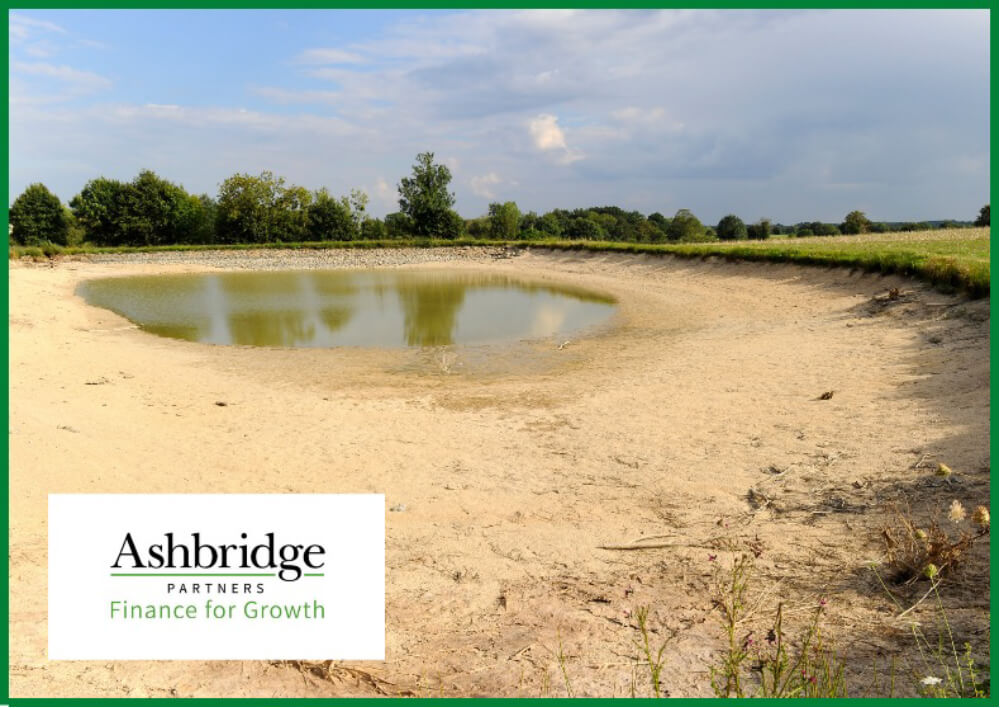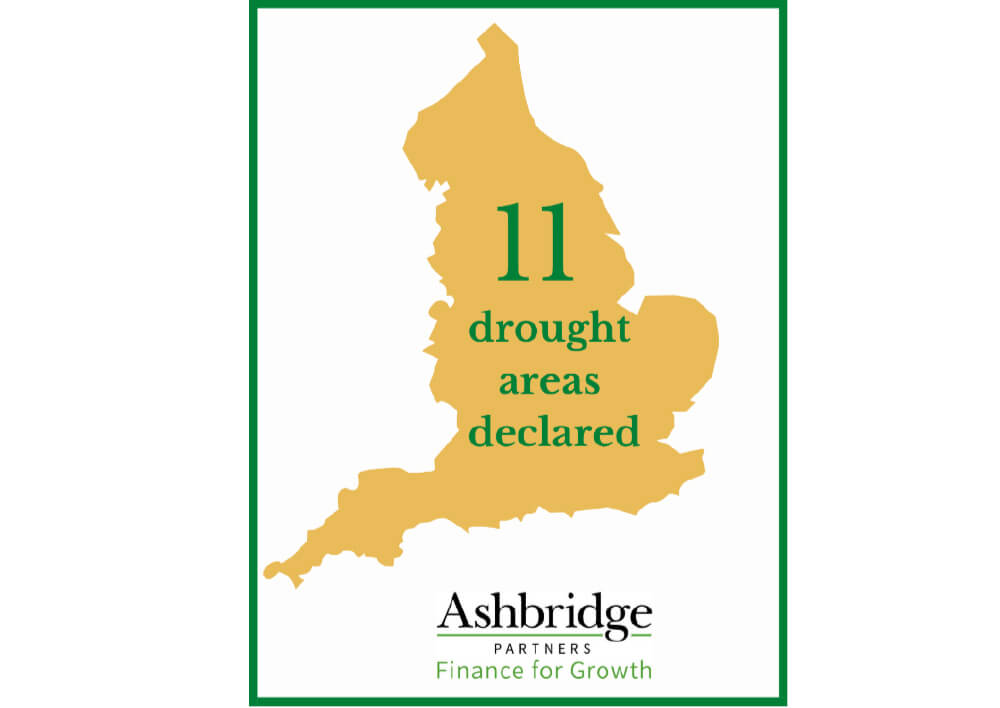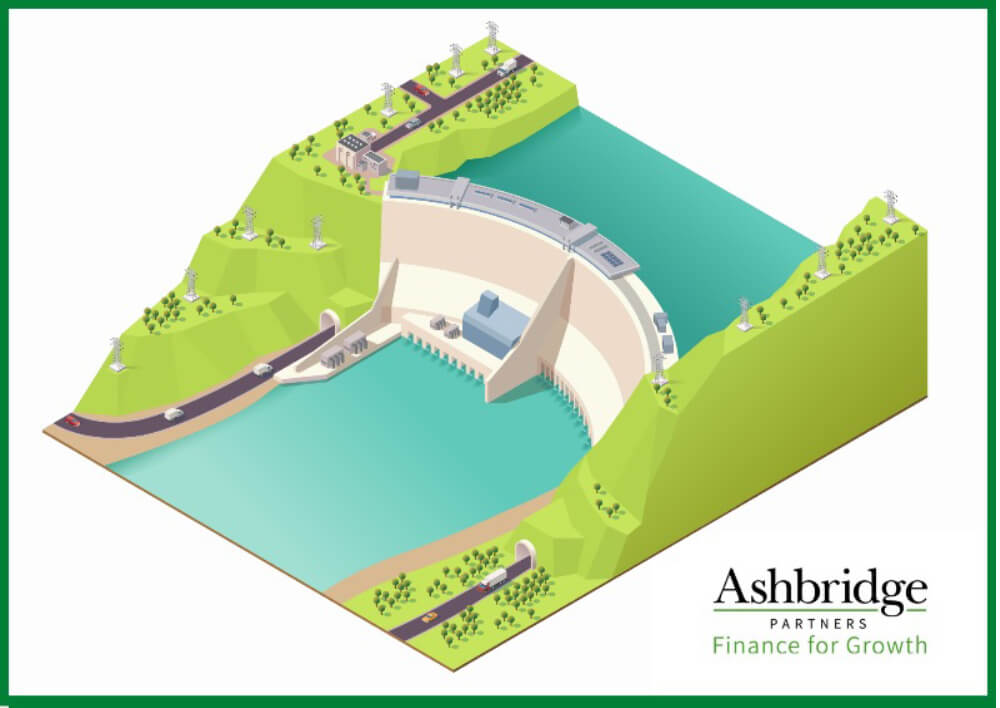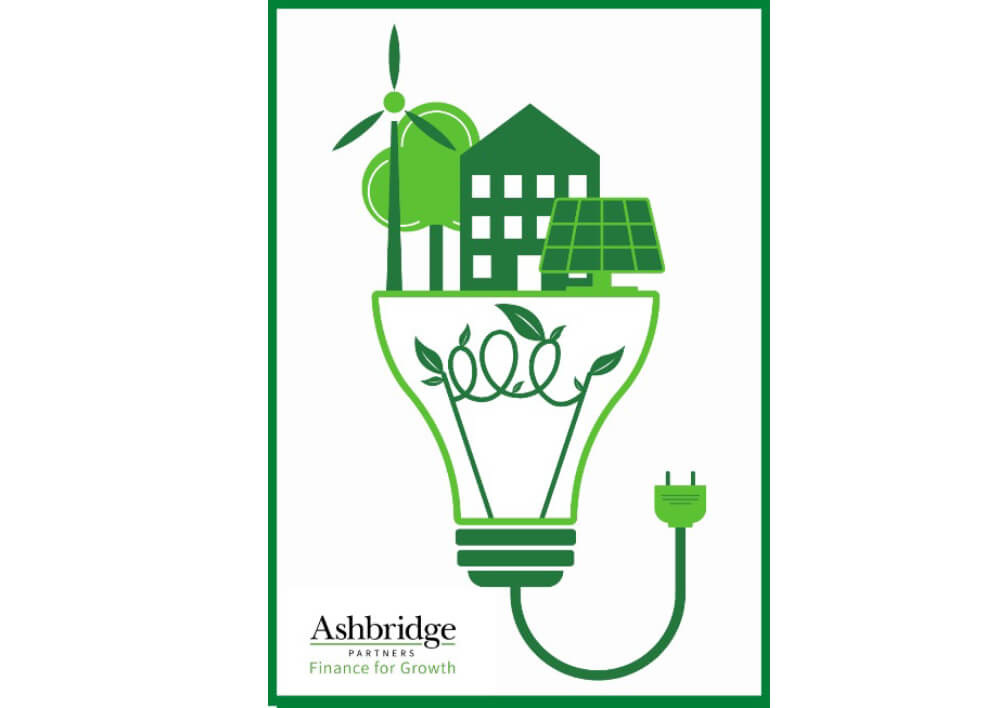Want to build your own reservoir? It’s time to dig deep
Water scarcity has hit headlines this year due to heatwaves, hosepipe bans and parched fields. In the face of global climate change, how can landed estates protect themselves from further drought, and how can we support our clients?
Our Associate Relationship Director, Henry Ash explores water management, reservoirs, pollution, and hydroelectric power. Read on to hear about some of the challenges that the team here at Ashbridge Partners work on with environmentally conscious landowners every day in the UK.
Private Water Management – Can I build my own reservoir?
It’s been the driest year in England since 1976, the worst European drought in 500 years. Farmers are now facing huge challenges, and we want to support our clients with their water security plans.
Harvest came early this year, reducing yields and potentially reducing the price received by up to 10%. To compound the problem, a lot of agricultural ground became too hard to drill after this summer’s successive heatwaves, and we also saw some fields go up in flames.

So how do landowners futureproof themselves? This summer, Sir James Bevan, head of the Environment Agency said “Our environment is the ultimate investment”. We’re getting involved in this by helping our clients invest in:
- increased water storage capacity
- irrigation systems which are more efficient
- renewable energy production.
There are a range of practical steps such as rainwater harvesting, water recycling, and fixing leaks. For those who can “dig deep”, private reservoirs are also an option. They can improve supply and potentially expand existing irrigated areas, opening up long-term business opportunities. This could be particularly supportive for intensive crop production (e.g. vegetables, potatoes, lettuce). This can add up to £1,500/acre to the value of land, and is likely to become increasingly valuable, according to Farmers Weekly.
We’re currently helping a client source funding to build an estate reservoir right now. This will safeguard a vital life-supply in these times of global climate change, and it’s an investment we’re sure to see many other clients consider after this dry summer. When you consider the implications of passively waiting for another drought, the value of new reservoir investment speaks for itself.
According to Guy Singh-Watson, founder of Riverford organic farm:
- It costs c. £5 per m3 of water contained to build a clay-lined reservoir
- In a dry year, 600m3 of water (£3000) are needed to grow an acre of lettuce
o i.e. 20,000 heads worth £10,000 at harvest - Investing £3000 can pay for itself 3 times over in 1 year if it saves a crop.

Water and Livestock – How do I protect animals from drought?
Animal agriculture accounts for nearly 20% of freshwater use globally, although this is disproportionately weighted towards intensive livestock farming. Continued global population growth, and a movement towards a more meat and dairy-intensive diet, will increasingly put pressure on our food and water systems over the coming years.
11 English areas were given drought status by the Environment Agency this summer, along with a large part of southwest Wales. The National Drought Group forecasts this continuing into next year.
River shrinkage is clearly one of the key factors examined before declaring a drought, but another is reservoirs, which have been at their lowest levels since records began in 1990. At the end of August, reservoirs in London were only 62% full (even 56% full in West London), a level below average for the time of year.

he combined impact of climate change and population growth means our water supplies are decreasing while demand for water is on the up. With this in mind, we actively support finding new ways to make each unit of water more productive, and are proud to support innovative clients.
One of our clients – a poultry farmer – is a frontrunner in such innovation, and has implemented a water recycling unit using rainwater harvesting. The rainwater is filtered and fed back clean, fresh, and cool. The chickens enjoy this far more than the warm, chemically treated water they were used to before.
This helps our client :
- safeguard against possible water shortages
- reduce longer-term cost for his business
- invest in sustainable practices
- be an environmentally responsible steward of his livestock
With rising food demand, and climate change making its impact, it’s vital that we limit any further increase in agricultural water demand. Water forms the largest component of an animal’s body – it’s critical in their survival, and in ours.
If investing in innovative practices which safeguard our eco-system is something you are considering, we would love to talk.
Water Pollution – From Plastic to Drastic
Half of all plastics ever made have been manufactured in the last 15 years.
Let that sink in. It’s already done so around the world.
Plastic pollution has been found in every corner of the globe, from the top of Mount Everest to the Mariana Trench, and is now even in the water we drink. The growth in plastic demand has consequences for us all. 1 in 3 fish caught for human consumption now contains plastic, and 70% of the oxygen we breathe is produced by marine plants. Our own survival is at stake.
The world’s unsustainable consumption of plastic is fuelling its production. While governments and large companies are being lobbied, we also have an individual responsibility at micro-level.
At Ashbridge Partners, our team strives to cut its plastic use in ordinary, everyday but collective ways – we now use reusable metal bottles for drinking water, for example, and hold each other accountable.
We feel very strongly about supporting clients who invest in sustainability. Interestingly, aside from “green grants”, there can be other cost-benefits for investors who look for environmentally friendly solutions. A plastic-lined reservoir is 40% more expensive than a clay-lined one – should permeability tests approve land fit for purpose, investing in plastic-free water security.

Climate Change and Hydroelectric Power – Am I prepared?
Water will now be at the forefront of climate change discussions. It’s the primary medium through which we feel its effects. In Britain, we will now be more likely to see water-logged winters following droughts and downpours than before.
Globally, changes in water security will affect food security and create political instability as the movement of people around the world becomes a question of necessity. Water availability is becoming less predictable, and extreme flooding threatens to destroy much of our access to clean water. Sea level rise will affect all of us, not least those who live in coastal communities.
With the UK’s Net Zero target set, we are now transitioning to a world of cleaner, greener energy production. Some of that energy production comes from hydroelectric power. But in times of drought, our electricity generation from hydroelectric sources is significantly reduced, made worse when our energy demand goes up as we use air conditioning to keep cool.

Taking a global perspective, look at the Three Gorges Dam, the world’s biggest power plant. It’s fed by the Yangtze River but this is at its lowest level since records began in 1865. It’s causing chaos – Shanghai has turned off its lights and escalators to conserve energy this summer.
Hydropower accounted for 18% of China’s power generation in 2020 – it’s China’s largest source of green energy. What can we learn from this?
If more droughts are likely in Britain, how reliant on hydropower should we be – or indeed can we be?
Some of our own clients host windfarms, or are actively considering doing so. Britain is said to be the windiest country in Europe, and in there lies opportunity. 20 turbines take up about 100ha (240 acres), but with a diameter of 5 metres, 99% of that area can still be used for crops or grazing (Farmers Weekly). That’s food for thought, and food for us all.
That is, of course, if your land is well watered.

We’re proud to be supporting proactive and environmentally conscious landowners. If you’re looking to invest in water management, get in touch to talk to our experienced team:
Are you a step ahead of the water crisis?
Henry Ash
01451 830223
henry@ashbridgepartners.co.uk
Mark Ashbridge
01451 830223
mark@ashbridgepartners.co.uk
